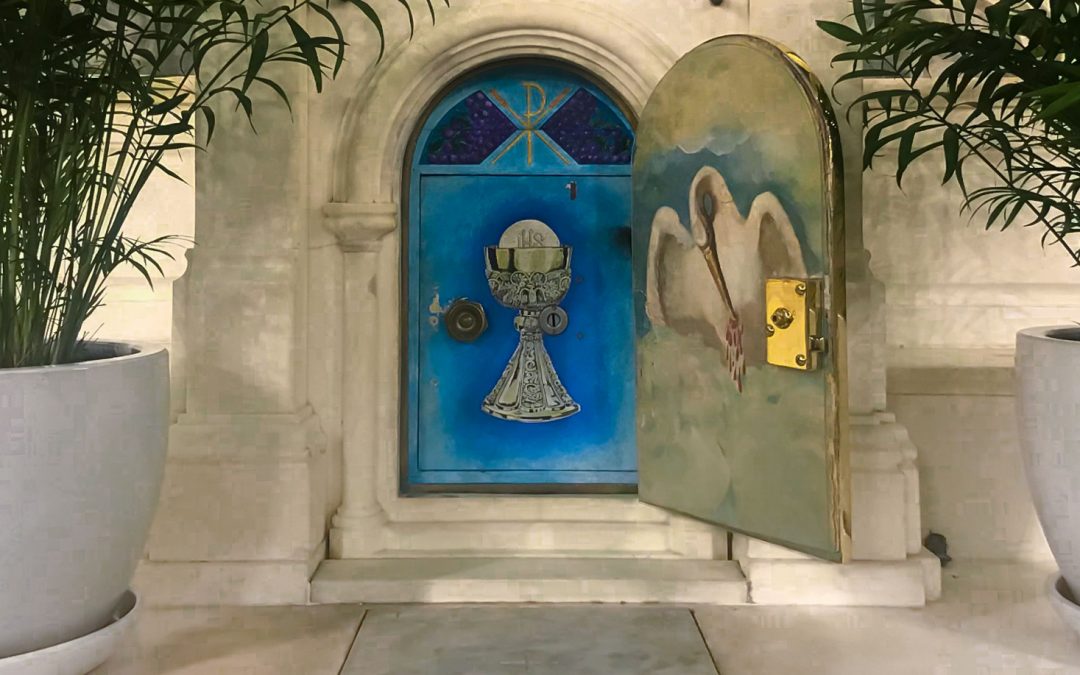Dear Friends,
An article in the Wall Street Journal this week reported that family grocery bills were increasing. That was because food prices, especially meat prices, were increasing and people were eating at home more frequently. I know that Jan, who takes care of our finances here at the parish, has mentioned to me a couple of times that I was spending more on groceries this year than last. I certainly have been eating at the rectory much more than in the past. It is one of the blessings and curses of the COVID time. However, meals are not something that can be avoided. Eating is part of being human. Meals nourish both our bodies and our spirits. Whether we eat at home or in a restaurant, it is an essential part of life.
This weekend, the Catholic Church celebrates a meal – Corpus Christi. The Eucharist – our gathered meal of thanksgiving of the life, death and resurrection of Christ – nourishes our bodies and our spirits through the actual presence of Christ.
At the Last Supper, Jesus tells his disciples to eat in remembrance of him. Of all the things he could have chosen to be done in remembrance, Jesus chose a meal. Jesus could have asked his disciples to do something impressive – climb a mountain, do a sweat lodge, walk through the desert – but instead he chose the most ordinary of acts, eating. He says that the bread is his body and the wine is his blood. He chose what was most ordinary and abundant – bread and wine. The simplicity of the gesture adds to its power. Scripture scholars like to remind us that Jesus, before his death, did not give us some long treatise on salvation, but gave us an act to perform and a service to be rendered. A meal shared speaks more deeply to us than any theory ever could.
The Eucharist is a memorial of Jesus’ act of “being broken,” of giving himself over in love. It makes present for us the reality of Christ’s dying as well as God’s response to that, the resurrection, and invites us to participate in that event. We participate in Jesus’ sacrifice for us when we, like him, let ourselves be broken. We participate in the sacrifice, when we, like him, share our love. The Eucharist invites us to become like the grains of wheat that make up the bread and the grapes that make up the wine, transformed so that we can become part of the communal loaf and single cup.
As I have mentioned a couple times in homilies, the ritual action done at every Eucharist with the gifts – offered, blessed, broken, and shared – is meant to become true of our own lives as it becomes true of the bread and the wine. We are chosen and offered to God, we are blessed by God, we are broken in our service and we are shared with the world. Occasionally when St. Augustine was giving the Eucharist to a communicant, instead of saying, “The body of Christ,” he would say, “receive what you are.” That puts things correctly. What is supposed to happen at the Eucharist is that we, the congregation, by sacrificing the things that divide us, should become the body and blood of Christ. Our world is so in need of Jesus at this time. You are the body of Christ for the world.
For many of you, participation in the Eucharist during the COVID time has been limited if not impossible. The divine food that you shared each week has been missing from your diet. I pray that this can change soon and that you will be able to rejoin us at the Lord’s table. Until then, please know that the Lord will find other ways to feed your spirit because he has not abandoned us.
Peace,
Fr. Damian



